Gov. JB Pritzker shared his fears about the future of climate policy under President Donald Trump — and his thoughts on how Illinois can stick to its climate goals amid federal funding cuts — at a climate conference Monday night in Chicago.
The Trump administration has enacted drastic funding and policy cuts across a range of sectors, largely targeting renewable energy incentives, scientific agencies and racial equity efforts. These cuts have left Illinois state lawmakers scrambling to fill budget holes, including a $771 million shortfall in funding for public transit that remains unresolved.
During his remarks Monday night in an interview with ABC anchor Linsey Davis, Pritzker conceded these federal changes have put state and national climate goals at risk. Yet he maintained that Illinois has retained its ability to lead the Midwest in climate policy, emphasizing the importance of economic incentives to bring renewable energy and green technology to the state.
“If you want to accelerate the endeavor on climate action, you’ve got to make it understandable to everybody that there are jobs and economic opportunities available to them as a result of the change in our economy,” Pritzker said.
The Climate and Equitable Jobs Act, passed by the Illinois legislature in 2021, has somewhat defined Pritzker’s approach to making green development projects economically feasible. The watershed act set Illinois’ goal of transitioning to renewable energy by 2050, established incentives for rooftop solar and electric vehicles and established clean energy workforce programs. Pritzker said that 70% of the state’s current power mix comes from clean energy, though nuclear power accounts for the vast majority of this. Wind, solar and other renewables make up just below 14% of Illinois’ power supply.
Since CEJA’s passage, the state has faced rising demand for electricity, leading to an increasingly unstable grid and consistent utility rate hikes. State legislators discussed passing another large energy bill this year that would have boosted energy storage and management for Illinois’ electric grid. The bill did not pass this session, but Pritzker said that he is committed to passing a similar package next year.
Though Pritzker recently announced that he will seek a third term as governor, many have speculated that he will throw his hat in the ring for the 2028 presidential election. Pritzker did not comment on a potential 2028 candidacy but when asked if he thought he’d make a good president, he said he thinks “the bar has been set pretty low.”
“(Democrats) still believe that the most important role that we have in government is to stand up for working families, for the most vulnerable, for the middle class,” he said. “Do Democrats get it right all the time? No, and I think that it is as much a failure of messaging as anything else. I’m not suggesting that Democrats haven’t gotten policies wrong. But let’s not walk away from civil rights because we lost an election.”
The discussion took place during the Aspen Ideas: Climate conference, a three-day event that has brought hundreds of state and local leaders to Chicago to talk about climate policy, clean energy and environmentally friendly infrastructure.
“Illinois has one of the most ambitious climate goals of any state, and so I think (we) just feel very proud to be from here, and to have the event here,” said Kobi Weinberg, a co-founder of the conference’s Chicago iteration and of the Chicago Climate Corps. “It’s not just trying to expand climate efforts here in Chicago but in the broader Midwest too.”
This is the first year the Aspen conference has taken place in Chicago. It has been held in Miami since its inception in 2022. Pritzker issued a statement in February to announce the conference was coming to Chicago, touting Illinois as a regional innovator in climate policy and infrastructure. He also spoke at last year’s conference in Florida.
Sunrise Movement activists held a rally Sunday at the University of Chicago, where some events during the first day of the Aspen Ideas: Climate conference were held. They called on Pritzker and other state authorities to pass a “Make Polluters Pay” act, which would require the fossil fuel industry — instead of taxpayers — to fund green, resilient infrastructure and disaster response in the face of climate change, following similar bills recently passed in Vermont and New York. Pritzker did not comment on the rally during Monday’s discussion.
Other speakers included Michigan Gov. Gretchen Whitmer, Alaska Gov. Mike Dunleavy and André Corrêa do Lago, president of United Nations climate conference COP30.
